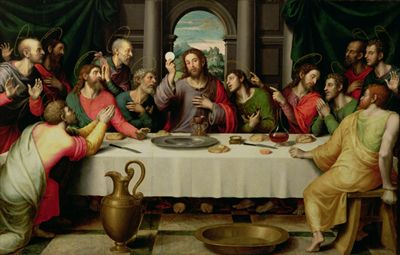
by John P. Pratt
4 Jul 2020, Passover (UH,UE), 1 Reed (SR), 1 Res (M), New Year (US)
©2020 by John P. Pratt. All rights Reserved.
|
1. Historical 1.1 Last Supper 1.2 Early Church 1.3 Nephites 1.4 Restoration 2. Updated Instructions 2.1 Unleavened Bread 2.2 First Sacrament 3. What weekday? 3.1 First Day of Week 3.2 Last Day of Week 3.3 Lord's Day 4. Conclusion Notes |
The Lord told the prophet Isaiah that in the last days that His people would change the ordinances and break the everlasting covenant (Isa. 24:5). One example of such changes concerns the sacrament of the Lord's Supper. Different Christian churches have modified it in various ways from the simple example which the Savior provided for us all at the Last Supper.
 |
As this article was being written, it was realized that there is a principle of "Good", "Better", and "Best", involved. That is, the Lord has specified a certain minimum standard required to hold the sacrament. If that is not met, then the ordinance has been "changed" and the covenant broken. But in different ages, the Lord has revealed a "better" way with improved significance, and recently, what might be called the "best" way has been revealed to be kept as we enter the Millennium.
It is hoped that these patterns cause the reader to examine the church to which he belongs and ask how closely the sacrament of the Lord's Supper there matches these patterns.
Let us now briefly review examples of how Christians have held the Sacrament of the Lord's Supper throughout the ages. For brevity, the title of that sacred ordinance is often referred to simply as "the sacrament".
The sacrament was introduced to the Savior's apostles during the Last Supper, which was actually a Passover Meal (Mat. 26:17). That is, during the traditional sacred Passover evening meal, Jesus suddenly introduced some new practices, and then simply said, "This do in remembrance of me". At first it must have been somewhat confusing to them, especially when he said that the bread was His body and the wine was His blood. They may have remembered that in one sermon, given on what would later be recognized to have been an Easter Sunday,[2] that He had mentioned that those who eat his body and drink his blood would have eternal life, which caused many of his followers to abandon Him. Jesus even had to ask the twelve disciples if they, too, would leave Him (John 6:54, 66-68).
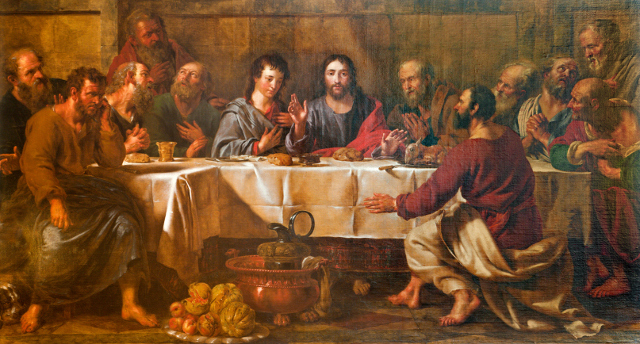 |
All that we are told about that simple sacrament service is that Jesus took bread, blessed it, and then broke it into pieces offering it to each of the disciples present, saying, "This is my body ... This do in remembrance of me" (Luke 22:19).
In so doing, the reader might wonder just how significant each part of even that simple ceremony would be necessary to emulate. For example, should the bread be held up? Should it be blessed before it is broken. Should there be just one one person officiating? Does that officiator need to be man? Is it necessary to hold the priesthood in order to administer the sacrament? Undoubtedly the Savior would meet with the apostles after the Resurrection to instruct them about such details.
He then took a cup of wine in His hand and blessed it. It was then passed around to each of the disciples present for them to drink some. This time He stated, "This is my blood" and they drank from the cup (Mark 14:23-24).
Again it can be asked if it is necessary today to use only one cup, whether it should be held up by the administrator, and if it is necessary to use wine.
Another question involves just when to hold this sacred ordinance. That evening was what we would call a Thursday. Should the sacrament always be held on a Thursday? It was also the evening meal beginning the week of Passover, also known as the Feast of Unleavened Bread at that time. Was he adding to the Passover meal ceremony? Or was He introducing something new?
The connection to that holy week raises another question. What kind of bread was used for the sacrament? Leavened or unleavened? The text does not tell us, but it is implied. For those seven days, it was unlawful to even have any leaven in the house, much less have or eat any leavened bread (Exo. 13:3, Lev. 23:6)! Thus, because of the time at which the Last Supper as held, there can be little doubt that the bread was unleavened because Jesus kept the law of Moses perfectly. So does the fact that Jesus used unleavened bread mean that all Christians should use unleavened bread?
Another question is how often should one partake of the sacrament? I grew up in an LDS home where it was understood to partake of the sacrament each Sunday. One day our family hosted a Russian Orthodox family and tried to find a Russian Orthodox church in northern Utah. The best we could find was Greek Orthodox, which greatly disappointed them. They explained that members only partook of the sacrament a few times a year, although they attended church weekly on Sundays. However, when they did partake, they spent over a week repenting and recommitting themselves to God in order to be sufficiently prepared for such a sacred ordinance. That made a huge impression on me as I compared it to how most in my church took the emblems perfunctorily, apparently with little thought of what they were doing.
Clearly, the Redeemer's first example of this ordinance is not enough to answer all of the questions which can arise. Thus, let us look at the later methods of true Christians and how they kept this ordinance.
After the Resurrection and Ascension of Jesus, His apostles officially organized the Church of Christ with various officers. Undoubtedly He gave them many specific instructions on just how to do that and how to administer the sacrament. Unfortunately, precious little has been preserved in the New Testament about those procedures (1 Cor. 11:23-29).
One of the main verses of the New Testament which refers to the sacrament and the on which it is be partaken is in the book Acts of the Apostles:
And upon the first day of the week, when the disciples came together to break bread, Paul preached unto them, ready to depart on the morrow; and continued his speech until midnight. -- Acts 20:7.
This one verse tells us quite a bit. First, it seems clear that "came together to break bread" refers to partaking of the sacrament. If so, that verse tells several things. First, the disciples performed this ordinance as a group. It apparently was not done individually, but as part of "coming together". That matches what the Savior did. For this reason, somethings this ordinance is called "communion", because the community of the Church meets for this purpose.
Secondly, it tells us that they administered the sacrament on the "first day of the week", the day most nations today call by the Pagan name "Sunday". The days were named for the sun, moon (Monday = Moon-day), and 5 visible planets (Saturday = Saturn-day).[3]. Another name for Sunday used by early Christians was "the Lord's Day" (Rev. 1:10). One medieval leader of the Catholic Church proposed changing the Pagan names to Christian names, where the first day of the week would be "Lord's Day" ("domingo" in Portuguese) and the seventh day would be "Sabbath" ("sabado" in Portuguese), and the other days would simply be numbered. That proposed practice was only adopted in Portugal and Brazil, where those names are still used today. Thus, the sacrament was administered on the Lord's Day (Sunday).
Third, the New Testament was written in Greek. There are two words for "bread" in that language. One is usually translated "bread" or "loaf" referring to leavened bread and the other is translated "unleavened bread". That is similar to use of "bread" and "tortilla" or "cracker" in English. That verse in Acts states that they broke "bread", even the previous verse uses the other word for "unleavened bread" (Acts 20:6). Thus, most churches use leavened bread for the sacrament, but some use wafers (unleavened). The New Testament alone does not make it clear which one to use, so it usually assumed that the difference is not important, any more than specifying barley or wheat bread.
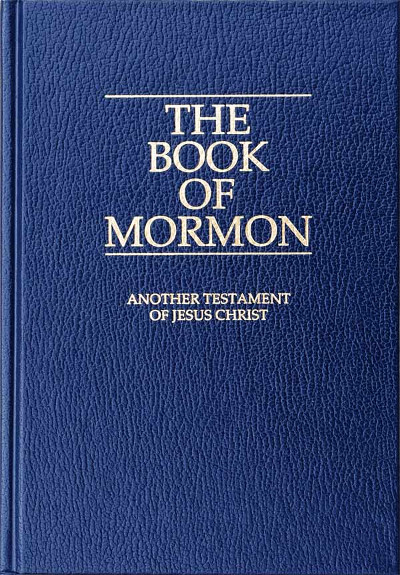 |
From it we learn that after Jesus appeared to the Nephites in the Americas after the Resurrection, they held the sacrament thus:
Much of this was assumed to be obvious by the writers of scripture and was overlooked during most of the Book of Mormon to include, even as it was not explained in the New Testament. The prophet Moroni added this information at the very end of the Book of Mormon as an afterthought, when he realized it had not been included. This is one example of the Book of Mormon clarifying needed doctrines that were omitted from the New Testament. Most of that volume was written by the apostle Paul to instruct the various churches (congregations) about what they did not know, not what he had already taught them in person. Those letters (epistles) were collected much later to be included in the New Testament.
Now let us consider how the Church of Christ, which was founded by the Prophet Joseph Smith in 1830, administered the sacrament. It was he who had translated the Book of Mormon into English by the gift and power of God, so the method was based largely on the procedure just described as contained in the Book of Mormon.
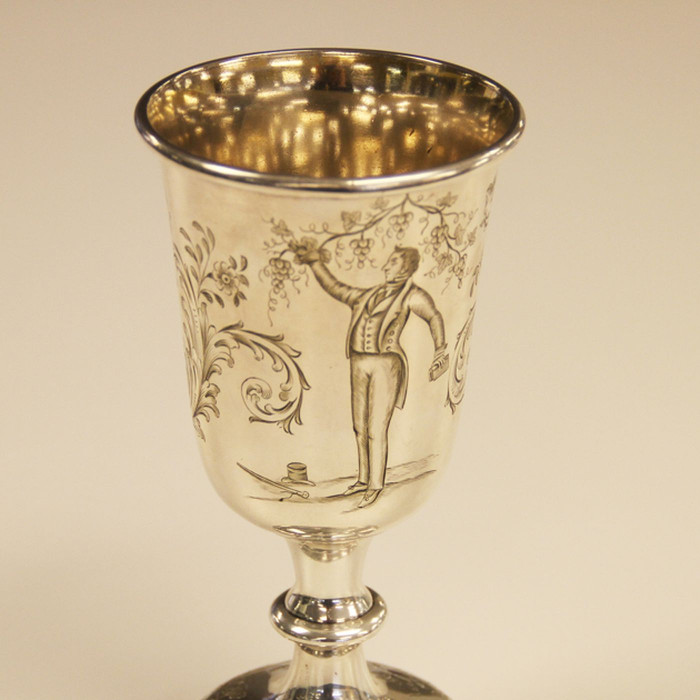 |
As for what was required for baptism, this is stated:
And again, by way of commandment to the church concerning the manner of baptism--All those who humble themselves before God, and desire to be baptized, and come forth with broken hearts and contrite spirits, and witness before the church that they have truly repented of all their sins, and are willing to take upon them the name of Jesus Christ, having a determination to serve him to the end, and truly manifest by their works that they have received of the Spirit of Christ unto the remission of their sins, shall be received by baptism into his church. -- D&C 20:37.
The sacrament was administered as described in the Book of Mormon, as summarized in the above sections, including the entire congregation kneeling together, using bread and wine, and only one cup (D&C 20:75-79).
As for the order of baptism, partaking of the sacrament for the first time, and being confirmed a member of the Church, Joseph Smith set an example at the founding of the Church of Christ on Tue 6 Apr 1830:
"Having opened the meeting by solemn prayer to our Heavenly Father, we proceeded, according to the previous commandment, to call on our brethren to know whether they accepted us as their teachers in the things of the Kingdom of God, and whether they were satisfied that we should proceed and be organized as a Church according to said commandment which we had received. To these several propositions they consented by a unanimous vote. I then laid my hands upon Oliver Cowdery, and ordained him an Elder of the Church of Christ, after which, he ordained me also to the office of an Elder of said Church. We then took bread, blessed it, and brake it with them; and also wine, blessed it, and drank it with them. We then laid our hands on each individual member of the Church present that they might receive the gift of the Holy Ghost and be confirmed members of the Church of Christ. The Holy Ghost was poured out upon us to a very great degree--some prophesied, whilst we all praised the Lord, and rejoiced exceedingly. DHC 1:77-78.
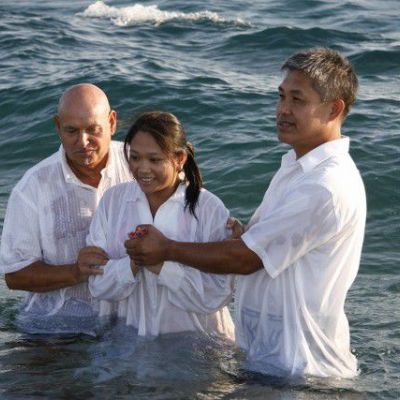 |
First of all, the Church was founded by men who had already been previously baptized. That is not explicitly stated, but baptism by the authority of the Aaronic Priesthood restored by John the Baptism is required before becoming a member of the Church, because that baptism is a "new and an everlasting covenant" (D&C 22:1), so that their previous baptisms into other churches did not suffice. It was the vote of those men which was important to establish the Church.[4]
Secondly, note that the baptized members partook of the sacrament before being confirmed members of the Church. Was that order important? It has not seemed so until now, but new instructions for the current age discussed below verify that that order is very significant. The very first time that a new member partakes of the sacrament is very important and to be done in a very memorable way, before being confirmed a member of the Church.
Two other details about the wine used in the sacrament are the following: (1) it is indeed wine which should be used in the sacrament, which is not good to be drunk much at other times (D&C 89:5) and (2) the sacrament wine should be of one's own making (D&C 89:5). Moreover, the Lord explicitly stated that the wine should not be made by one's enemies (D&C 27:3-4).
For many years the sacrament wine was made in southern Utah, but with the advent of the railroad in 1869, that pretty much ceased because it was cheaper to import wine. Since then commercial wine or even water has been used, with water taking over exclusively for convenience since about 1900 in the Utah LDS Church. This has resulted in a much "watered down" sacrament service.
The Lord has now restored the first part of the sealed portion of the Plates of Mormon, from which the Book of Mormon was translated. The result is a book entitled The Sealed Book which has been discussed in detail in an earlier article.[5] Another article describes my personal witness of having examined the gold plates myself.[6] The translator, Mauricio Berger, has also been commissioned with starting an acceptable continuation of the original Church begun by the Prophet Joseph Smith because none of the splinter groups which arose after the martyrdom of Joseph and Hyrum have managed to keep the higher priesthood intact, nor to preserve the proper form of the ordinances. They have, in fact, fulfilled Isaiah's prophecy of having changed "the ordinance, broken the everlasting covenant" (Isa. 24:5). That includes the large corporate church in Utah. Moreover, a branch of the "reborn" true Church has now been started in Utah,[7] and other branches are rapidly in the process of springing up across the country.[8]
What do the Sealed Book and other revelations to Mauricio the Seer add to the already known instructions about how to administer the sacrament? Let's look at three areas: the bread, the first taking of the sacrament, and the day on which to hold the weekly sacrament. One reason for treating these details so seriously, is there is a statement in the Sealed Book that states that we will only be given the other part of the sealed portion of the Plates of Mormon scheduled to come forth before the Second Coming after we have learned to live what is in the part already available to us (Words of Moroni 13).
Let us begin with the bread. One of the questions left open from the above sections was whether or not the bread of the sacrament should be leavened or unleavened. Above it was concluded that it should probably be our usual leavened bread, even though the Savior used unleavened at the Last Supper. That conclusion was based on the fact the the references to the sacrament used by the apostles of Christ, by the Nephites and by the Church of Christ begun by Joseph Smith all seem to indicate that usual leavened bread was used.
Moreover, to my knowledge, there is nothing in The Sealed Book which states that unleavened bread is to be used.
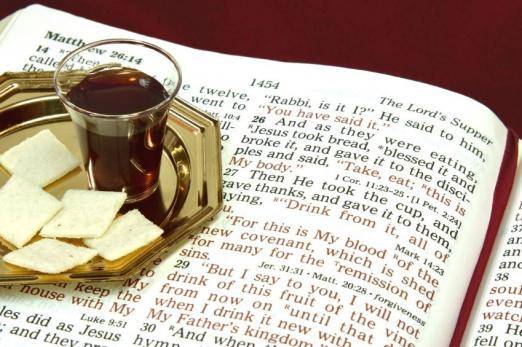 |
It turns out there is a yet unpublished set of revelations from the Lord given through the Angel Moroni. They are long and detailed. Here is part of one verse which does indeed command the use of unleavened bread:
And as for those who come to you, both the Gentiles who will be baptized, as well as those who will proceed from the restoration already baptized under the authority of the lesser priesthood, it is up to you to lead them to the understanding of all things before they take the sacrament in communion with the church, but only after having understood all the doctrines relating to my church and having committed themselves to fulfill all my statutes, then they will be able to take upon themselves the name of Christ, through the participation of the unleavened bread and wine, in the sacramental ordinance with my people, and only after that, they will be confirmed members of my church and, if they are worthy, they will receive from Me, the Lord, the gift of the Holy Ghost, by correctly pronouncing the words described in Acts 2:38 by the elder who utters the prayer because his hands rest on the head of the new member. -- Instructions From Moroni 1:23 (emphasis added).
These instructions clarify two of the questions raised earlier in this article. First, this quote explicitly specifies that the bread should be unleavened. That settles the question! When Jesus used unleavened bread it was not simply because the first sacrament service just happened to fall during the days of Unleavened Bread, but it was all planned that way in advance.
And following the Lord's counsel about making one's own wine, it might well be best to make one's own unleavened bread, and avoid buying it from one's enemies.
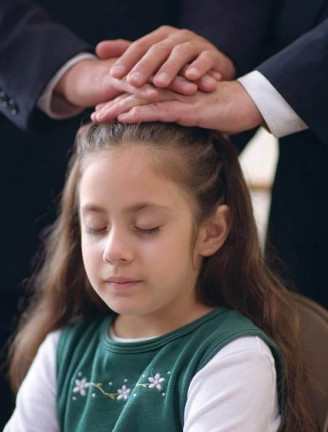 |
Here we see the importance of the first time one partakes of the sacrament. We see why it was important that a young child was never allowed to partake of the sacrament because that would simply make it into a perfunctory rite which has little meaning, because the young child had not made any commitment whatsoever to Christ. The first time that someone partakes of the sacrament should be a special and meaningful time indeed.
Now that we have seen the importance of the first time that one partakes of the sacrament, we can appreciate that the Lord commands that it be done in a way that the new member will always remember!
The Lord made wonderful use of feasts in the law of Moses. There were several holy feast days throughout the year. The Israelites were better at keeping those feasts, and doing so on the specified days, than at keeping other commandments. They have especially kept the Feast of Passover in the spring. Who doesn't like a good feast?
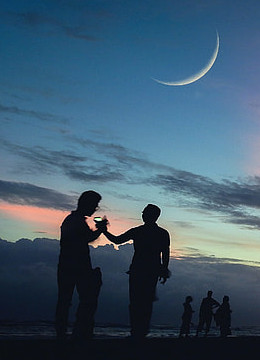 |
Except at the new moon, for inasmuch as the sacrament is to be offered at the end of the day, when the first moon appears in the heaven of every month, every month of the year, on any day of the week, as a special day of adoration; yea, on this day my people will hold a special banquet in regard to the newly baptized members of my Church, so that, they can for the first time share my body which has been given for the benefit of their sins in the flesh and of my blood for the sake of an everlasting life, just as it was done among my disciples and the Nephite people, so that on this new moon day you must be filled by the Holy Spirit in a true spiritual banquet in honor of those who repent and are baptized in my name.
For like the first moon, they shine for the first time among my people on earth, for inasmuch as my angels celebrate with this first communion between them and the heavens, among whom many hear their songs of praise in the land. -- Acts of Three Nephites 12:25-26.
Thus, we see that a special banquet is to be held on the evening of the first day on which the new thin crescent moon is visible for all new members who have been baptized during that month! As part of that feast, the new members are allowed to partake of the sacrament for the first time. Just think of how meaningful that would make partaking of the sacrament! Young children would have waited at least eight years for this opportunity and then it would be the occasion of a feast with the members of their family and congregation participating with them![9] It would be an occasion which they could remember each time they later partook of sacrament weekly throughout the rest of their lives.
Finally, there comes the question of what is the holy day of the week that we should celebrate.
Until The Sealed Book came forth, to me this was a settled question. Now that book has led to further enlightenment!
After the Resurrection the apostles of Jesus partook of the sacrament on the first day of the week, the day we call Sunday (Acts 20:7). Another word for that day used by early Christians was "the Lord's Day" (Rev. 1:10).
Moreover, the Lord told Joseph Smith in somewhat veiled language that Sunday is the correct day to keep holy and offer up the sacrament. He said it was to be done on "this day", which was "the Lord's Day", and the day on which that intelligence was shared was on Sun 7 Aug 1831. Thus, to me, it was a settled question: Sunday was the correct day to keep holy and worship. Even so, it was clear to me from my sacred calendar work that the most holy day of the week began at Saturday noon and went to Sunday noon. Therefore, my articles recommended that Sunday worship services be held on Sunday mornings.[10]
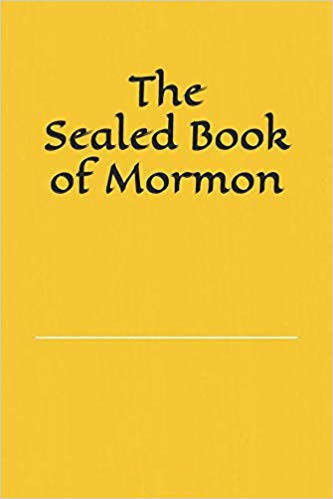 |
O people of my church, ye with whom my name shall be lifted up, yea, as a standard among the nations in the fulness of times, once and for all, you should understand that the relationship between the seventh day and the people of God is at the core of the whole truth of my gospel from before the foundation of the world until its end, and that it is perpetually intertwined with the sacrament of holy supper that I instituted among my apostles before I left Jerusalem....
Behold, it is on the seventh day, which was sanctified by my Father, that should introduce yourself as people before God, and offer unto him your sacraments, just as they are revealed in the holy scriptures, in righteousness of heart and a contrite spirit; so that you may keep yourselves clean from one Sabbath to another, and as Alma has asserted among you, may render thanks to the Lord your God every day. -- Acts of Three Nephites 12:24, 27
This last verse makes it clear that the people of God in the fulness of time should offer up their sacraments on the seventh day, which is Saturday. Can this be reconciled with what the Lord also told Joseph Smith to offer up their sacraments on the Lord's day?
Let us now look at exactly what the Lord said to Joseph, in the somewhat veiled language, which never included the word "Sunday":
And that thou mayest more fully keep thyself unspotted from the world, thou shalt go to the house of prayer and offer up thy sacraments upon my holy day;
For verily this is a day appointed unto you to rest from your labors, and to pay thy devotions unto the Most High;
Nevertheless thy vows shall be offered up in righteousness on all days and at all times;
But remember that on this, the Lord's day, thou shalt offer thine oblations and thy sacraments unto the Most High, confessing thy sins unto thy brethren, and before the Lord.
And on this day thou shalt do none other thing, only let thy food be prepared with singleness of heart that thy fasting may be perfect, or, in other words, that thy joy may be full. -- D&C 59:13
Although these verses make it clear how the holy day should be kept, they do not actually say the word "Sunday" anywhere, so the reader might not know what day is referred to if it was not known that these words were said on the first Sunday that the Prophet Joseph was in the land of Zion (near Independence, Missouri). Why did the Lord avoid saying "Sunday". Was it only because He did not want to use the Pagan name for the day, as has been hitherto assumed in my work?
Now a way to resolve the apparent contradiction between the Lord's words to Joseph Smith, and the words in the Acts of the Three Nephites suggests itself.
The proposed resolution is the following: it is proposed that the "Lord's Day" begins Saturday at noon and runs through Sunday at noon (local sundial time). Let's see how this resolves the conflict, which also agrees with my earlier conclusion from sacred calendars that this is the most holy day (24-hour period) of the week.
When the record of the Three Nephites states that the sacrament should be held on the seventh day, it could refer to Saturday afternoon. And if the Lord revealed to Joseph Smith that "this day" is the day to worship and hold the sacrament, it could have said on that Sunday morning. If so, then it appears that the weekly sacrament could either be held on Saturday afternoon or Sunday morning. At the time of Joseph Smith, there was no hint of holding it on Saturday, but Sunday morning could well have been indicated. But in our day, Saturday afternoon might be preferable because the emphasis was placed on the seventh day.
In support of this interpretation, The Sealed Book also says the Lord's Day should be kept holy:
The learned scholars of the law among my people in the last days will be accustomed to look at the Sabbath with contempt, ignoring the fact of what was written by the prophets of the past. And behold, a genuine repentance will be necessary among the elect of the fulness of times for having too much profaned the Lord's day.
... ye should understand that the relationship between the seventh day and the people of God is at the core of the whole truth of my Gospel from before the foundation of the world until its end and that it is perpetually intertwined with the sacrament of holy supper which I instituted among My apostles before I left Jerusalem. -- Acts of Three Nephites 12:23-24 (emphasis added).
Here we see not only the importance of keeping the seventh day holy, and the Lord's day holy, but that they are "intertwined" with the sacrament!. What an interesting choice of words! That can be explained if the Lord's day begins at noon on Saturday (the seventh day) and ends at noon on Sunday (the first day), thus "intertwining" the two days!
Thus, one new proposed result of this article is that the scriptural "Lord's Day" runs from noon Saturday to noon Sunday!
The details of exactly how to hold a sacrament service were reviewed by tracing how true Christians have celebrated the sacred ritual throughout the ages, from the Last Supper, apostles of Christ, and the restoration through Joseph Smith.
Then updated instructions for us now as we enter the Millennium were reviewed from The Sealed Book and also from a hitherto unpublished revelation from the Lord through the Angel Moroni to Mauricio Berger. Those instructions include that the bread of the sacrament should be unleavened, which has not been followed by most Christians, even though it was clearly unleavened bread which was used by the Savior.
Another new commandment is a wonderful way to impress upon the new convert the importance of the sacrament. The very first time the newly baptized person is to be allowed to partake of the emblems of the body and blood of Christ is at a banquet to be held for all new members at the first appearance of the young crescent moon after their baptism. Even as the family often gathers for a baptism, now the community of the Church will gather their first communion!
Then, only after the candidate has made sacred vows to take upon themselves the name of Jesus Christ, to always remember Him, and to keep His commandments which He has given them, may they be confirmed a member of the Church.
All of these new procedures not only clarify the importance of each of these important steps, they add significance without diminishing in any way what had been known before, but fitting perfectly into the already established framework.